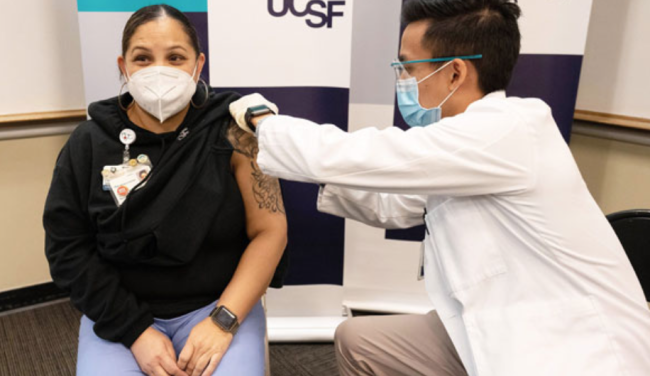You have /5 articles left.
Sign up for a free account or log in.

Susan Merrell/University of California
The legal landscape for pandemic-related vaccine requirements continues to evolve, this time in California: the state's Public Employment Relations Board ruled that the University of California system had the right to mandate the flu vaccine for all students and employees last fall without first consulting its employee unions. The system was worried about a "twindemic," meaning flu season and COVID-19, and tried to mitigate it prior to the COVID-19 vaccine being available.
"The implementation of the university's influenza vaccination policy was a direct response to a potential confluence of the COVID-19 global pandemic and an outbreak of the influenza virus causing catastrophic outcomes and needless loss of life," the board wrote in its decision. "This potential catastrophe affected not just university employees, but also its students and the general public who may have needed to use university hospitals. Under these unprecedented circumstances, requiring the university to negotiate the decision to require influenza vaccination would abridge its right to determine public health policy during a pandemic."
At the same time, the board ruled that the UC system violated state labor law by adopting the mandate before negotiating with its employee unions about the effects of the decision. Such effects include consequences for noncompliance.
The UC system took the board's partially favorable decision as a win.
"We are pleased with the decision from the Public Employment Relations Board that recognizes the University of California's flu vaccine mandate was outside of the scope of bargaining," Heather Harper, system spokesperson, said. "As PERB noted, the unprecedented circumstances of a potential confluence of the COVID-19 and influenza viruses create significant risks that the policy was needed to address."
Harper said the university will continue to work with its union partners through the bargaining process to address the policy adoption issues cited by PERB.
Last summer, fearing that the approaching annual flu season would push university hospitals already caring for COVID-19 patients to the brink, the system's then-president, Janet Napolitano, signed an executive order about the flu vaccine mandate. The initial deadline to get vaccinated was Nov. 1, 2020. The order, which was later extended to Nov. 16, 2020, listed several medical exemptions, such as severe egg allergies, and allowed for requests for disability and religious exemptions.
Three university employee unions -- the Teamsters, the American Federation of State, County and Municipal Employees, and the University Professional and Technical Employees, Communication Workers of America, which represent healthcare professionals, research support professionals and clerical workers, among other non-faculty groups -- soon demanded to bargain over the mandate and its effects.
The university eventually said that it would not bargain over the mandate decision but that it would negotiate the implications. The university and the UPTE, for instance, met four times, with the union seeking time off for employees to get vaccinated, payment for costs association with being vaccinated, where employees could be vaccinated, consequences for those who refused to be vaccinated, vaccination deadlines and exemptions. The union and the university agreed on time off to get vaccinated, and the university supplied the union a list of places to be vaccinated and encouraged workers to use their health insurance. But that was it.
The unions later filed unfair labor practice claims against the university. The Teamsters asked for an injunction against the mandate, which was denied.
In reviewing these cases, the board said that the primary issue was whether the flu vaccine mandate fell within the scope of union representation. Citing state labor law, the board said items that are within this scope involve the employment relationship, are likely to be resolved through collective bargaining, and won't compromise managerial prerogatives essential to the university mission.
While vaccine mandates involve the employment relationship, the board found, they're unlikely to benefit or be resolved through collective bargaining. To illustrate the latter point, the board cited a 1989 PERB decision regarding an indoor smoking ban within Riverside schools, in which the board found "collective negotiations between the district and employee organizations is not an appropriate means of dealing with this public health hazard." Moreover, PERB has repeatedly found that public health and safety can outweigh the benefits of collective bargaining.
Regarding the effects of the mandate, however, the board said that "before implementing a non-negotiable change, the parties must first negotiate over aspects of the change that impact matters within the scope of representation."
The board acknowledged that the university had refused to bargain over consequences for not getting vaccinated, and had given contradictory messages as to those consequences, from not being allowed on campus to being put on unpaid leave. Because policies that may lead to disciplinary action have a direct link to pay and benefits, the board said, an employer's "outright refusal to bargain over matters within the scope of representation constitutes a per se violation of the duty to bargain in good faith." Any remedy would involve making affected employees whole, the board said, though there is little evidence that anyone suffered a loss under the policy.
The flu vaccine order refers to the 2020-21 flu season, but now that a COVID-19 vaccine is available, the university has ordered all students and employees to be vaccinated against the latter for the coming academic year.
The PERB decision sets a clear precedent for the university's right to insist on vaccination itself for all employees.
William Herbert, executive director of the National Center for the Study of Collective Bargaining in Higher Education and the Professions at Hunter College of the City University of New York, said it's "very likely" that the California board will apply the same reasoning to future cases involving the negotiability of a COVID-19 vaccination mandate in California's public sector. And the decision "will certainly have relevance if or when" state labor relations agencies elsewhere consider similar cases, Herbert said.
Unions are one way states beyond California may be asked to weigh in on vaccine mandates. Courts are another. Last week, a federal appeals court sided strongly with Indiana University in a case brought by students who had argued that a COVID-19 vaccine mandate violated their due process rights.
Writing for the three-judge panel in that case, Judge Frank Easterbrook wrote, "People who do not want to be vaccinated may go elsewhere. Many universities require vaccination against SARS-CoV-2, but many others do not. Plaintiffs have ample educational opportunities."
Todd Zywicki, a professor of law at George Mason University, is suing that institution over its mask-or-vaccinate policy. Zywicki, who is not vaccinated, says that he previously contracted COVID-19 and therefore has natural antibodies against the virus. Even though federal health authorities urge vaccination for those who have already been infected, Zywicki says a vaccine would offer him no additional benefits. He also says he should not be required to wear a mask under George Mason's "coercive" and "unlawful" policy.
Harper, of the UC system, said that vaccinations against both COVID-19 and the flu remain "a critical step toward protecting the health and safety of the UC community and the public at large." The system's COVID-19 vaccine mandate for this fall is therefore "vital for a return to in-person activities."









